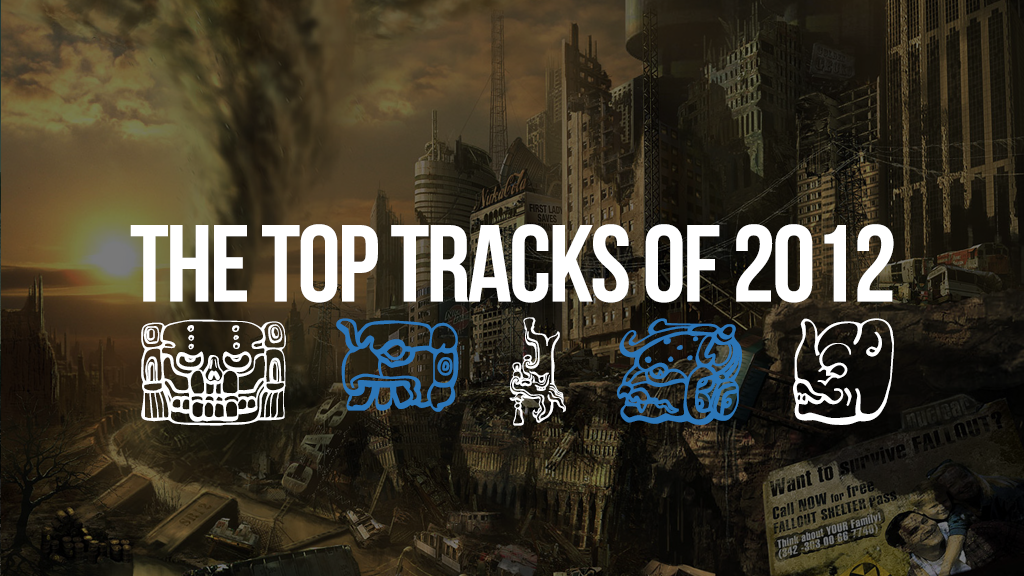
We’ve compiled as many of these tracks as are available into this Spotify playlist.
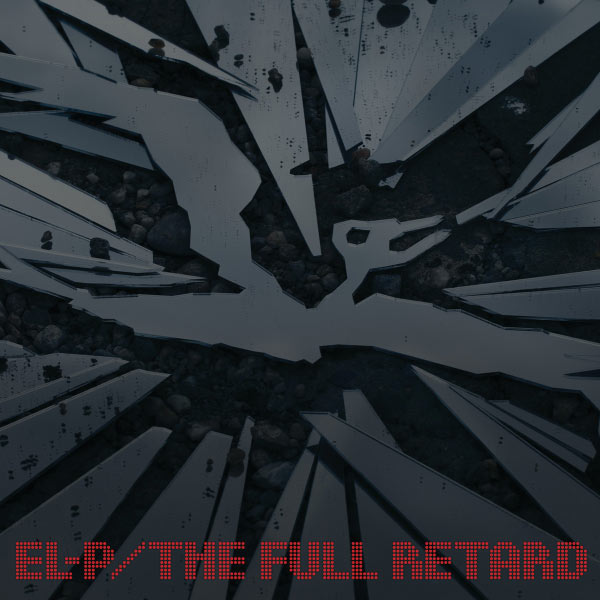
10.
El-P
“The Full Retard”
[Fat Possum]
Combining a twisting, mechanical beat with EL-P’s inimitable flow, “The Full Retard” seems like it was sent back in time from some point in the distant future. Full of paranoid thoughts like “…got me on a radar with a dot/these watching, plotting minions of the lower God scene” and “Here’s a mirror mirror to peer, fear grows clearer/steer a path away from the panic of our era” amid chrome-plated stabs of synths and a spoken word section that speaks about a future “where harmony and love reign,” “The Full Retard” is El-P’s response to society and our obsession with obsession. And despite this promised brighter future, EL-P has no plans on looking to some utopian paradise just yet, and so he throws cut up beats and slices of industrial noise against the walls of the studio and makes the result sound like the heaviest banger of 2035. His free-associative rhyming may often seem non-linear and bizarre but his sudden, violent outbursts get under your skin and slowly persuade you that what you’re hearing makes perfect sense. This is the sound of things to come, and “The Full Retard” is what you’re going to hear as society crumbles. So just sit back and take the song’s advice to “pump this shit like they do in the future” until that future gets here.
– Joshua Pickard
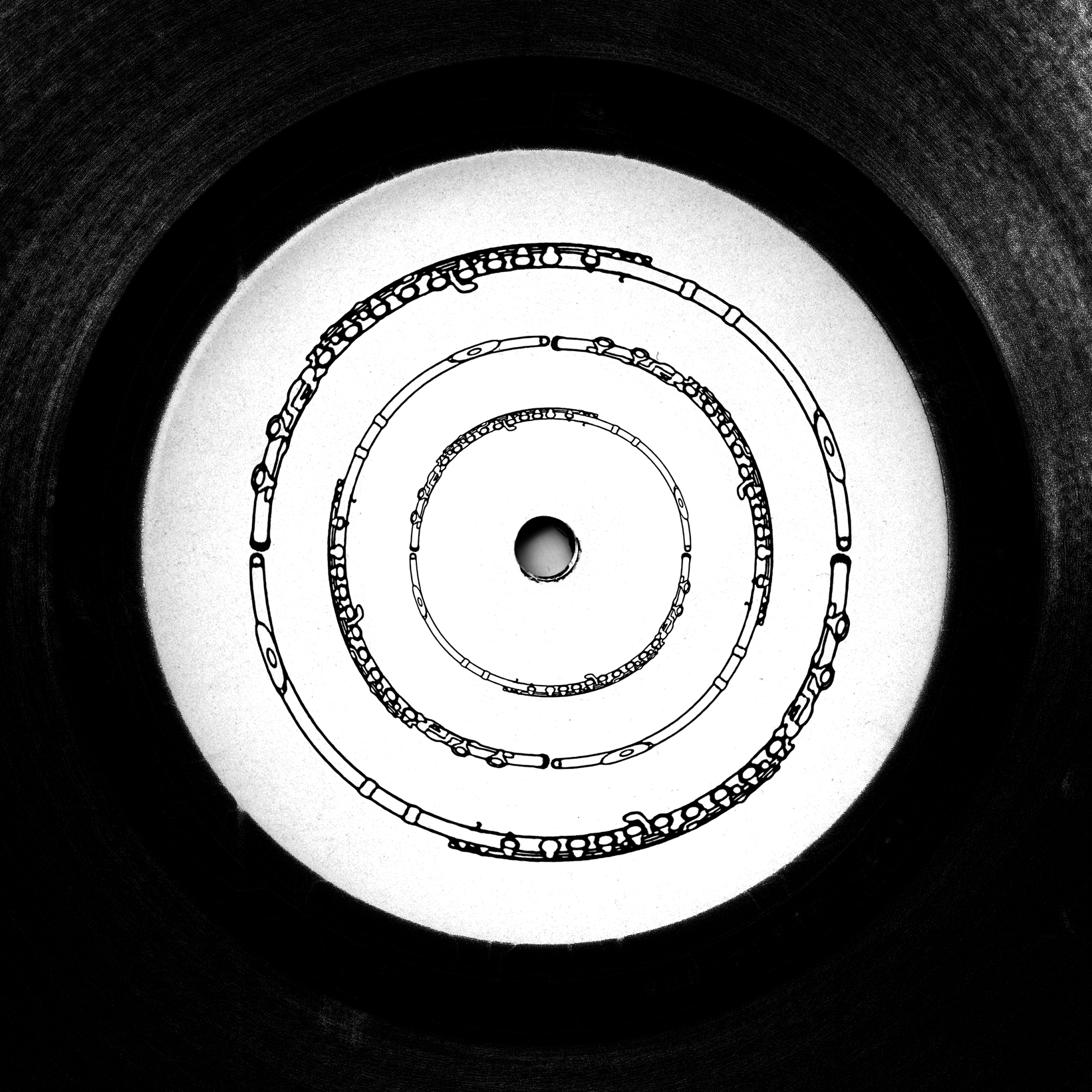
09.
Hot Chip
“Flutes”
[Domino]
I’ve seen a handful of people praise “Flutes” pretty much solely for “the drop,” which probably says all you need to know about 2012 as a whole. Undoubtedly the little drum fill that tips the track over the precipice is wonderful and shows Hot Chip as masters of precision, acutely aware that pace is everything and exercising restraint is crucial before ramping tension up to unbearable levels, allowing for a split-second of weightlessness before deploying the breakdown to devastating effect. But “Flutes” proves that the band have their eye on a grander prize than the dancefloor. Yes, their consistency in delivering deeply enjoyable and endlessly replayable records like clockwork every two years has rendered them almost overly dependable; it’s as if every record naturally comes packaged with at least two bona fide pop gems that couple sincerity and ingenuity with absolute belters of pop hooks. And while “Flutes” is outstanding, it arguably sits outside the top 5 Hot Chip tracks, and In Our Heads isn’t close anywhere close to being the best record they’ve put out (it’s still great, mind).
However, it may be the purest distillation of the Hot Chip M.O. to date, striking the perfect balance between emotional resonance and propulsive grooves, tugging at both heartstrings and hips as Alexis Taylor’s plaintive coos glide over the beat and feeling like a radio edit when the run time is closer to a 12″ extended mix. Having subtly but emphatically presented a case over the past seven years that they have outgrown their presupposed role as heirs apparent to New Order’s dance floor crown, “Flutes” adds yet another string to Hot Chip’s bow and reinforces the idea that they must now be seriously considered as the finest British band to emerge this century.
– Gabriel Szatan
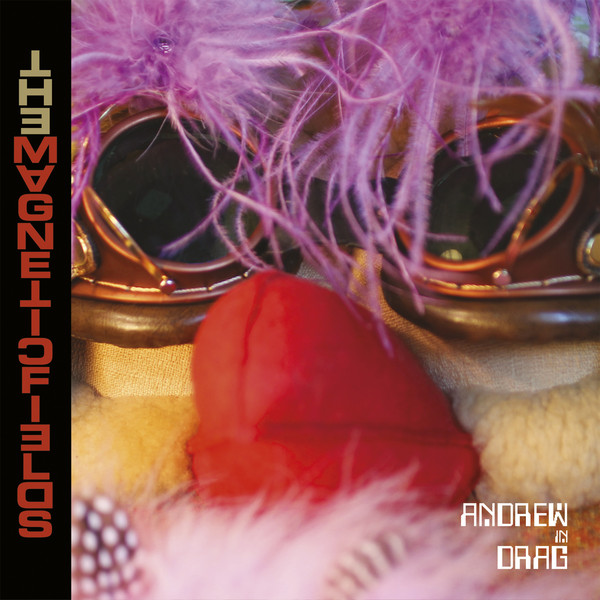
08.
The Magnetic Fields
“Andrew In Drag”
[Merge]
It’s rare for a songwriter to continue putting out regular material 20+ years into their career, but it’s even rarer that they might be putting out some of their all-time best songs — especially after they already spent 69 great ones on one album. But lo and behold, Stephin Merritt strolled into 2012 with the best indie pop song of the year, and his best since you-know-what. Following in a string of great lead singles (“I Don’t Believe You,” “California Girls,” “You Must Be Out Of Your Mind”), “Andrew In Drag” trumps the rest by simply being the most Magnetic Fields-y Magnetic Fields song in years. Devoid of the musical thematicism and genre-parodying of Distortion or Realism, “Andrew In Drag” is a concise, no-frills summations of the Fields’ pop potency: a couple of great hooks, an only-slightly-offbeat arrangement, and a great lyrical concept, this time about a straight boy who falls in love with his best friend — but only while he’s dressed in drag. “Andrew in Drag” is beauty in economy, in 2 short minutes proving that Merritt’s secret formula is as effective as its ever been. Two decades later, the rest of the indie pop world is still playing catch-up.
– Ryan Stanley
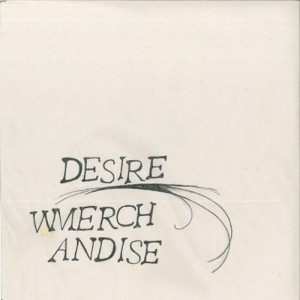
07.
Merchandise
“Become What You Are”
[Katorga Works]
Merchandise’s 11-minute epic “Become What You Are” forms the centerpiece of their second album, Children of Desire. It’s a song indebted to krautrock in the way it marches relentlessly onwards through a forceful drumbeat, but also owes nods to shoegaze and dream pop in the way the glistening guitars roll and tumble around each other, forming an undercurrent that stays strong throughout. Carson Cox’s lyrics add to the mix, perfectly summing up the mid-20s outsider disillusionment towards life, touching on the his shortcomings and the failures of others, all delivered with a Morrissey-like tenderness that can’t help but draw you in, and with the guitars re-affirming themselves with more vigour between verses, the song’s suction becomes ever more powerful.
Halfway through, the song disintegrates into a passage of guitars and tinkling bells, leading the way into the song’s effervescent second half. It quickly builds up again, this time at a faster pace, with layers of feedback coalescing to form a simmering layer of static between the growling guitars and Cox’s heavenly wordless vocals. These elements boil together until the feedback has the quality of a low flying plane and Cox is repeating “Everybody hide, baby, everybody hide, I am terrified.” A wacked-out and wailing organ is added to the mix, recalling Stereolab at their most frenetic, as the brew churns faster and faster until the song is audibly unspooling with vocals, guitars, feedback and more all flying off in different directions. Finally the song vanishes into a black hole of silence, allowing the listener to relax and breathlessly reflect the previous 11 minutes of glorious rocking tumult.
–Rob Hakimian

06.
AlunaGeorge
“Your Drums, Your Love”
[Island]
Given the directions that “Your Drums, Your Love” pushed the aesthetic of the London duo AlunaGeorge, their former home on Tri Angle records seems even stranger than it once did. Tri Angle artists, by and large, tend to delve into the murky and dank nether-regions of electronic music. Holy Other mined it to romantic effect on his outstanding 2012 LP Held and Balam Acab’s blunted cavern exploration made last year’s Wander/Wonder one of 2011’s most interesting releases. Aluna Francis and George Reid shunned such haziness on their debut EP for Tri Angle in favor of the sort of spaced out synth sounds that made the Neptunes production work the most sought after of its era. “Your Drums, Your Love” followed soon after, toting a similar sort of production aesthetic — bright and technicolor to their cohorts blissed out monochrome — and paired it with an absolutely ascendant vocal take that blows many of 2012’s pop-weirdos out of the water. The shady vocal sample and booming 808 kick mirrors much of Purity Ring’s best material, but Francis’ vocal take is far more expressive and inviting than Meghan James would ever offer. It synthesizes the influence of 90’s R&B work and creates something that feels wholly of the moment, within the purview of fellow travelers like Purity Ring, like Grimes, like Nite Jewel — except, well, better.
– Colin Joyce

05.
Tame Impala
“Apocalypse Dreams”
[Modular]
Rising out of the ashes of Lonerism’s sweeping first two tracks, “Apocalypse Dreams” saunters through the strawberry fields of Kevin Parker’s mind, all sprightly piano and jaunty drums and falsetto vocals. For many songwriters, this would be little more than excuse for 60s pop-rock revivalism, but Parker is smarter and more sonically adventurous than that. Which probably explains why the track segues into 70’s prog for the chorus before making several sharp left turns into forward-thinking space rock and the sorts of overt psychedelic gestures that made 2010’s Innerspeaker such fun to behold. But the best part of this song is the tension between the chipper music and the darker lyrics. “This could be the day that we push through,” he begins (emphasis added). He’s “too terrified to try our best,” and he can’t help but wonder, “Does it even matter? Do I really need this?” It actually doesn’t really matter what “this” refers to; we can all relate to the feelings of self-doubt and hesitancy he exhibits here. “Nothing ever changes,” he laments at song’s end; happily, however, we know that’s a lie. For one thing, Tame Impala changed from just a psych rock band — a really good psych rock band, at that — to something more original and futuristic and deliriously miasmatic. If they can change (“they” being Parker and his touring bandmates) then why can’t we?
– Josh Becker

04.
Kendrick Lamar
“Sing About Me, I’m Dying Of Thirst”
[Aftermath / Interscope / Top Dawg Ent.]
The past 12 months have witnessed the continued resurgence of a hip-hop stereotype as old as the genre itself: that one surefire way to make your voice heard above the racket of a cluttered field was to front a ruthlessness that bordered on recklessness; basically rap game Roman Abramovich. Invariably a load of hot air, even the tiny fraction of artists able to back their chat couldn’t match Kendrick’s ability to send shivers down one’s spine, and on “Sing About Me, I’m Dying of Thirst” he delivered unquestionably the coldest track of the year. It was all too evident on the wince-worthy gunshots that clip the first verse short and the unsettling manner in which the defiant refrain of “I’ll never fade away” is rendered futile in real-time as the vocals sink deeper into the black recess of the mix; no matter how many times I try to test the fallibility of the song, being fully aware that Dave’s brother and Keisha’s sister will both fall prey to their respective fate doesn’t make me any less likely to stop dead in my tracks as the track unfurls. There’s so much to be said for Kendrick’s lyrical dexterity which must have been endlessly revised over to ensure every last word was imbued with some greater meaning, as well as his flawless embodiment of multiple personas, from cadence to candour, that makes the entire album as a whole so endlessly fascinating. Add that to the backdrop, which fits Kendrick’s narration like a glove. Elegiac strings hover uneasily above the chorus, further embellishing the funereal tone in the first half, while the choral undertones neatly complement the urgency that comes with the amplified beat in the second. But as good as the production is, this track rests on Kendrick alone.
Somehow “Sing About Me” manages to be the centerpiece in a record hardly short on heart-stopping and jaw-dropping moments, but its not merely the 12 minute length that cements this. Here we find an end to the incessant time-stretching and narrative layering, where the thematic ley lines converge and K.Dot’s transformation to Kendrick Lamar is fully realised. Both deeply personal and broadly affecting, Kendrick’s disarmingly candid approach helped avoid any semblance of preachiness, especially in the ‘Dying of Thirst’ section which would have surely been little more than an irritating skit in almost anyone else’s hands. good kid, m.A.A.d city is staggering from front-to-back, but if really pressed to call it, “Sing About Me” just about edges it as the strongest cut on the record; as such, it will remain one of 2012’s finest pieces of music across any discipline. “The tongue is mighty powerful” indeed.
– Gabriel Szatan

03.
Andy Stott
“Numb”
[Modern Love]
“Numb” opens with a sample of Andy Stott’s former piano teacher Alison Skidmore singing the word “touch,” but it’s spliced in a way that means that the song opens with the second half of the world only; this is immediately disorienting for the listener, but as the sample goes on to be repeated and form the basis of one of the many looped layers in the track, it is clear that this is Stott’s intention, and that he knows exactly where every noise he uses should go and how it should sound. For the first two and a half minutes of the song, Stott masterfully constructs the track from a selection of these haunting samples, some allowed to breathe full sentences, while others are chopped minutely into little pressures of sounds hissing in and out at a quick pace. This is all wrapped in an ominous and shapeless swell of sound that builds in conjunction with the samples, until the ‘drop’ comes. Rather than adding to the momentum of the song, the industrial-yet-ghostly thump rotates its way through the song knocking everything out of its way, sounding like someone’s inside your skull trying to hollow it out. Stott builds the track up again and assimilates the disparate sounds of the cut up human voice and his own otherworldly resonances into an irresistible and almost incomprehensible rhythm – and one that is certainly unique amongst any other music currently out there.
– Rob Hakimian
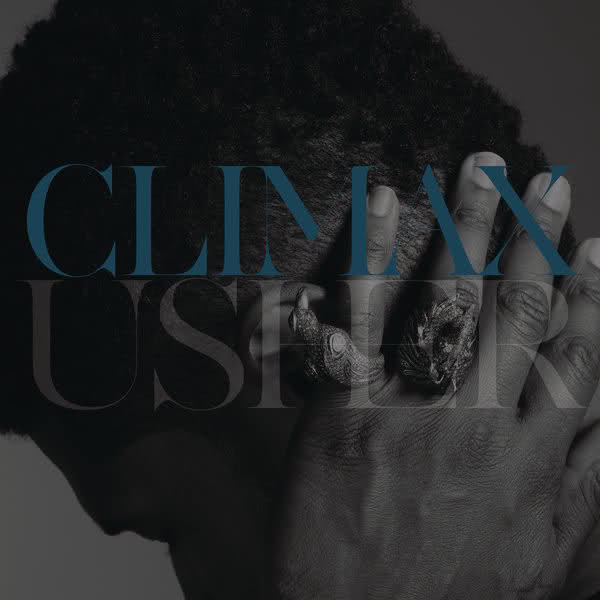
02.
Usher
“Climax”
[RCA]
Usher and Diplo, two of 2012’s most accomplished musical lotharios, dropping a song on Valentine’s Day? That had to be an all-time bedroom-rocking, panty-dropping classic, right? But “Climax” turned heads more than it melted hearts. It’s an impossibly smooth, yet hopelessly fragmented mockery of a slow jam, where Usher does but doesn’t want to get back together with a woman who he knows it won’t work out with. Mr. U. Raymond has mined this territory before, notably on his classic “Burn” single, but the emotions and musical underpinning on “Climax” are more tangled and fraught with tension, as Diplo forgoes a traditional verse-chorus-verse song structure, instead replacing verses with ever rising (climaxing?) bridges that force Usher to grow in intensity alongside. The great irony is that “Climax” never reaches its own, instead teasing at a resolution that would have only come with the impossible: reconciliation.
– Chris Bosman
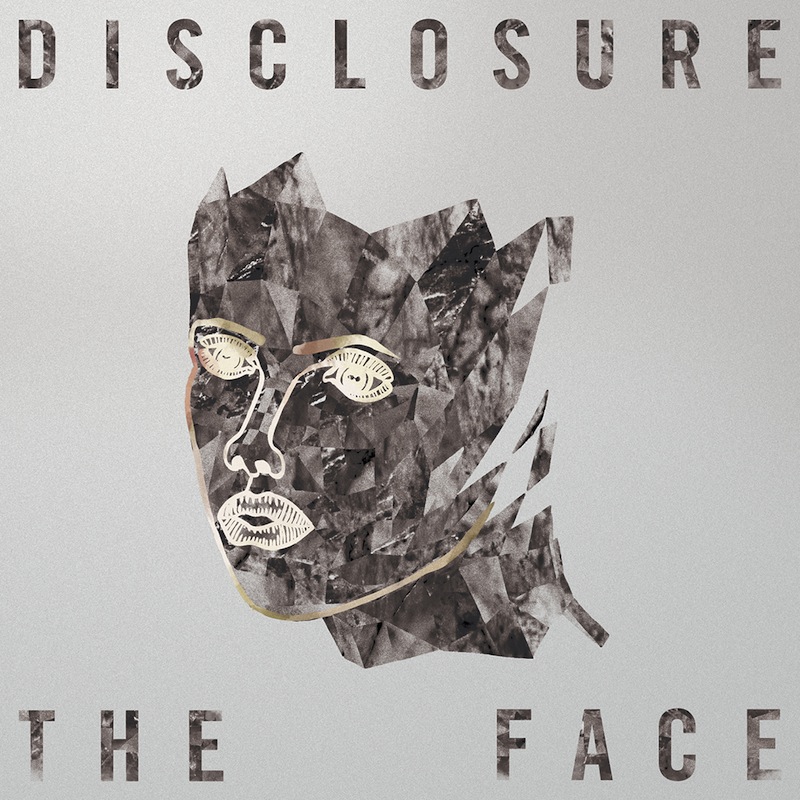
01.
Disclosure
“What’s In Your Head”
[Greco-Roman]
The narrative that’s followed Disclosure for most of 2012 revolves around where the British duo of Guy and Howard Lawrence came from and where they’re going. But “What’s In Your Head” is a distilled and singular moment for the brothers. It’s the rare track that bottles the very core of a feeling of such vibrance and breathless energy that the world in which it exists feels like it’s been put on hold. It’s the feeling of the dance floor’s high built up and disassembled in the space of five and half minutes. Each tiny dimension of the track has been dusted and swept, all the surfaces sanded smooth and polished, and all the lingering oxygen vacuumed out. There’s only enough left to breathe. Every second of “What’s In Your Head” feels endlessly pondered and meticulously crafted with its intricate primary-colored pinwheel of vamping synths, fragged vocals, porn samples, and click-snap drums, yet it has the acrobatic dexterity of a DJ glued to the controls. And then there’s the vocal hook, oh sweet baby Jesus, that vocal hook. The sample is cut up into a syncopated bombing run and spun into a thrilling puzzle piece amalgam like a cracked statue bursting and reassembling in cyclonic formation, all in the space of a measure.
“What’s In Your Head” is hardly the most important or representative track of the year, but it’s obvious from the first listen that there’s perfection here. One of the trends and themes that’s resulted from critical discourse over the course of 2012 is that the best music doesn’t exist as part of some nebulous canon or greater single-tracked narrative anymore. That our job as lovers and critics of music isn’t to preserve what’s appreciated by the future and that the music we put on these lists isn’t beholden to some higher specter of authority. Instead of something “important and representative” we decided to go with a track that we loved and could not stop listening to.
– Will Ryan

